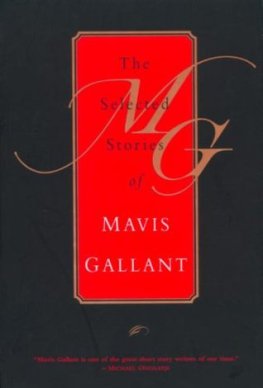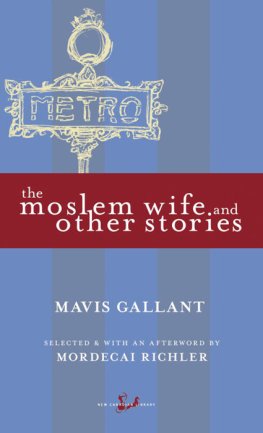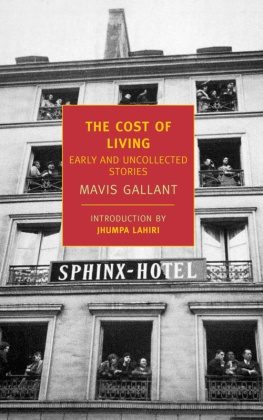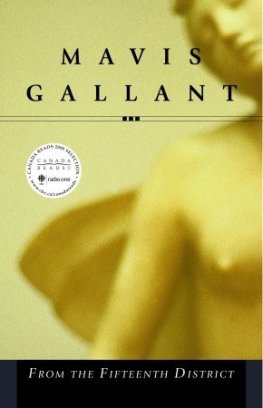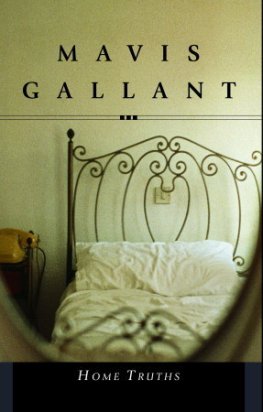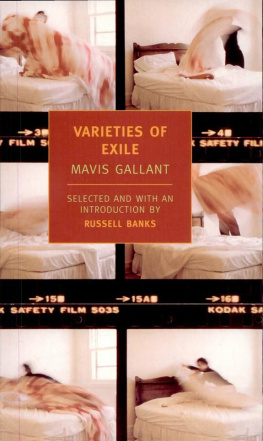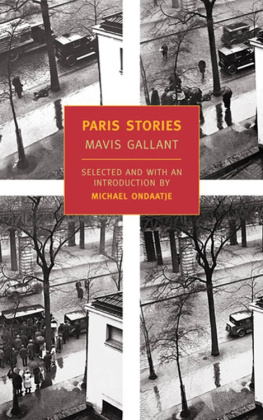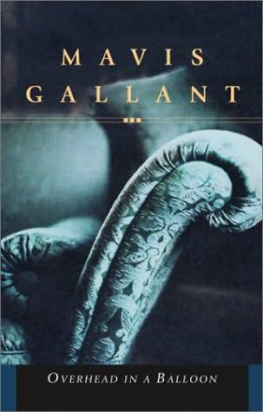Mavis Gallant
The Selected Stories of Mavis Gallant
To
BILL MAXWELL
and to
DAN MENAKER

Samuel Beckett, answering a hopeless question from a Paris newspaperWhy do you write?said it was all he was good for: Bon qua a. Georges Bernanos said that writing was like rowing a boat out to sea: The shoreline disappears, it is too late to turn back, and the rower becomes a galley slave. When Colette was seventy-five and crippled with arthritis she said that now, at last, she could write anything she wanted without having to count on what it would bring in. Marguerite Yourcenar said that if she had inherited the estate left by her mother and then gambled away by her father, she might never have written another word. Jean-Paul Sartre said that writing is an end in itself. (I was twenty-two and working on a newspaper in Montreal when I interviewed him. I had not asked him the why of the matter but the what.) The Polish poet Aleksander Wat told me that it was like the story of the camel and the Bedouin; in the end, the camel takes over. So that was the writing life: an insistent camel.
I have been writing or just thinking about things to write since I was a child. I invented rhymes and stories when I could not get to sleep and in the morning when I was told it was too early to get up, and I uttered dialogue for a large colony of paper dolls. Once, I was astonished to hear my mother say, Oh, she talks to herself all the time. I had not realized that that kind of speech could be overheard, and, of course, I was not talking but supplying a voice. If I pin it down as an adult calling, I have lived in writing, like a spoonful of water in a river, for more than forty-five years. (If I add the six years I spent on a weekly newspaperThe Standard, dead and buried now it comes to more than fifty. At that time, at home, I was steadily filling an old picnic hamper with notebooks and manuscripts. The distinction between journalism and fiction is the difference between without and within. Journalism recounts as exactly and economically as possible the weather in the street; fiction takes no notice of that particular weather but brings to life a distillation of all weathers, a climate of the mind. Which is not to say it need not be exact and economical: It is precision of a different order.)
I still do not know what impels anyone sound of mind to leave dry land and spend a lifetime describing people who do not exist. If it is childs play, an extension of make-believe something one is frequently assured by persons who write about writing how to account for the overriding wish to do that, just that, only that, and consider it as rational an occupation as riding a racing bike over the Alps? Perhaps the cultural attach at a Canadian embassy who said to me Yes, but what do you really do? was expressing an adult opinion. Perhaps a writer is, in fact, a child in disguise, with a childs lucid view of grown-ups, accurate as to atmosphere, improvising when it tries to make sense of adult behavior. Peter Quennell, imagining Shakespeare, which means imagining the inexplicable, says that Shakespeare heard the secret summons and was sent along his proper path. The secret summons, the proper path, are what saints and geniuses hold in common. So do great writers, the semi-great, the good, the lesser, the dogged, the trudgers, and the merely anxious. All will discover that Paradise (everybodys future) is crisscrossed with hedges. Looking across a hedge to the green place where genius is consigned, we shall see them assembled, waiting to receive a collective reward if only they will agree on the source of the summons and the start of the proper path. The choir of voices floating back above the hedge probably will be singing, Bon qua a for want of knowing.
Janet Flanner, a great journalist of the age, the New Yorker correspondent in Paris for half a century, when on the brink of her eighties said she would rather have been a writer of fiction. The need to make a living, the common lot, had kept her from leaving something she did brilliantly and setting off for, perhaps, nowhere. She had published fiction, but not much and not satisfactorily. Now she believed her desire to write had been greater than her talent. Something was missing. My father, who was younger than Janet Flanner and who died in his early thirties, never thought of himself as anything but a painter. It may have been just as well for him that he did not go on to discover that he could never have been more than a dedicated amateur. He did not try and fail: In a sense, he never started out, except along the path of some firm ideal concerning life and art. The ideality required displacement; he went from England to Canada. His friends would recall him as levelheaded. No one ever heard him say that he had hoped for this or regretted that. His persona as an artist was so matter-of-fact, so taken for granted, so fully accepted by other people, that it was years until I understood what should have been obvious: He also had worked and gone to an office, before he became too ill to work at anything.
What did you imagine you lived on? said the family friend who had just let me know that my father was, after all, like most other people. He was with a firm that imported massive office furnishings of heavy wood and employed Englishmen. Not every business wanted Englishmen. They had a reputation for criticizing Canada and failing to pull their weight. Quite often they just filled posts where they could do no real harm or they held generic job titles. It created a small inflation of inspectors, controllers, estimators, managers, assistants, counselors, and vice-presidents. Some hung on to a military rank from the First World War and went about as captains and majors. This minor imperial sham survived into the 1930s, when the Depression caved in on jobs and pseudo-jobs alike.
At eighteen I went to look at the office building, which was a gray stone house on Beaver Hall Hill. I remembered having been taken there, wearing my convent school uniform of black serge with a clerical collar, and being introduced to a man with an English accent. My father was inclined to show me off, and I was used to it. What I had retained of the visit (or so it came back) was a glowing lampshade made of green glass and a polished desk of some dark wood and a shadowy room, a winter room. It was on Beaver Hall Hill, around the same time, that another stranger stopped me in the street because I looked so startlingly like my late father. The possibility of a grown daughter cannot have been uppermost: I had vanished from Montreal at ten and come back on my own. The legal age for making such decisions was twenty-one: I had made it at eighteen and hoped no one would notice. A few people in Montreal believed I had died. It was a rumor, a floating story with no setting or plot, and it had ceased to affect anyone, by now, except for a family of French Canadians who had been offering prayers every year on my birthday.
Years later, in a town called Chteauguay, I would hear a trailing echo of the report. We had spent summers there and, once, two whole winters. The paralyzing winter wind blowing from the Chteauguay River was supposed to be restorative for the frail. My mother, who never had a cold, breathed it in and said, sincerely, Isnt it glorious! I came back to Chteauguay fifty years after taking the Montreal train for the last time, across the bridge, over the river. I came with a television crew from Toronto. We were looking at places where I had been as a child. At one address in Montreal we had found a bank. My first school had become a vacant lot. The small building where I had rented my first independent apartment, installed my own furniture, filled shelves with books and political pamphlets (as many as possible of them banned in Quebec), hung pictures, bought inch by inch from Montreal painters, then a flourishing school, was now a students residence, run-down, sagging, neglected. I would never have returned alone to Chteauguay. It was the last place where we had lived as a family. When my father died, I was told he had gone to England and would be back before long, and I had believed it. A television unit is composed of strangers, largely indifferent, intent on getting the assignment over and a flight home. Their indifference was what I needed: a thick glass wall against the effects of memory.

